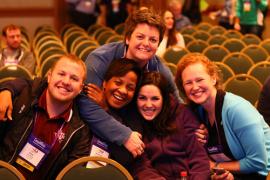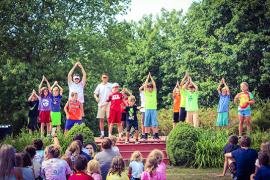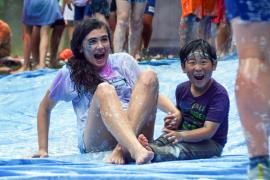To continue with our blog series spotlighting the work our Community of Practice has been doing, I’m sharing what our Assessment Development Working Group worked on over the winter. As a reminder, we created three distinct working groups focused on Continuous Quality Improvement Systems Design, Assessment Development, Toolkit and Resource Development, and a Diversity, Equity, and Inclusion Integration Team to weave these values throughout our program quality work. Here is the organizing structure of our work:
What Is Program Quality?
Practitioners define program quality as the factors that foster youth development within an organization, including policies, activities, program environment (physical and social-emotional), and the ways in which young people interact with camp staff and with one another. Program quality originates at the organizational level, flows through programming, and is facilitated by frontline staff.
Purpose of the Assessment Development Working Group
This working group’s purpose was to provide input into the Camp Program Quality Assessment (CPQA) tool and training resources. The revised CPQA would then inform the training workshops offered in spring 2021 and will be tested at camps in summer 2021. This group, comprised of camp and youth development professionals, worked together to accomplish the following:
- Refine the items and process for assessing program quality in camp programs
- Develop a Camp PQA Handbook to support the use of the assessment at camps
- Ensure that the Camp PQA represents inclusive, culturally responsive practices that can be adapted to the needs of local communities
The Assessment Development Working Group met biweekly throughout the winter of 2020-2021 to make progress toward these goals. Using the Weikart Center for Youth Program Quality’s newest assessment — the Social and Emotional Learning PQA (SEL PQA) — as the starting point, the working group revised items to reflect the summer camp context while maintaining the integrity of the research-validated tool. These meetings resulted in a new version of the Camp PQA that we will be piloting this summer, a tool with examples adapted specifically for the camp setting.
The Camp PQA that will be piloted as part of the Camp Program Quality Initiative this summer is different from the original Camp PQA short form that many ACA camps have used for years and there are several benefits to this updated measure. First, this version of the Camp PQA is based on the Weikart Center’s most up-to-date research about assessing program quality and supporting social and emotional learning.1 Second, although it still measures camp staff practices that support campers’ sense of camp as safe, supportive, interactive, and engaging, it does so with fewer items. Finally, because the tool is similar to the SEL PQA, camps can compare program quality scores with other youth serving organizations around the country.
What’s Next for the Camp PQA?
This summer, the camps in our Community of Practice (see our list of community members here) will be piloting this new tool with a self-assessment process where camp staff observe their own programs. This summer will provide an opportunity to reflect on how this new Camp PQA supports program quality improvement for a summer camp context.
Keep an eye out for our next Camp Program Quality Initiative blog post on our Toolkit and Resource Development working group! If you’re interested in learning more, please contact me at [email protected].
|
What Is Social and Emotional Learning? According to the Collaborative for Academic, Social, and Emotional Learning (CASEL), social and emotional learning is the process through which all young people and adults acquire and apply the knowledge, skills, and attitudes to develop healthy identities, manage emotions, and achieve personal and collective goals, feel and show empathy for others, establish and maintain supportive relationships, and make caring and responsible decisions. |
1forumfyi.org/knowledge-center/preparing-youth-to-thrive-promising-practices-for-social-emotional-learning/; forumfyi.org/knowledge-center/selpqa-overview-of-items-scales/
Thanks to our research partner, Redwoods.
Additional thanks goes to our research supporter, Chaco.
The views and opinions expressed by contributors are their own and do not necessarily reflect the views of the American Camp Association or ACA employees.





